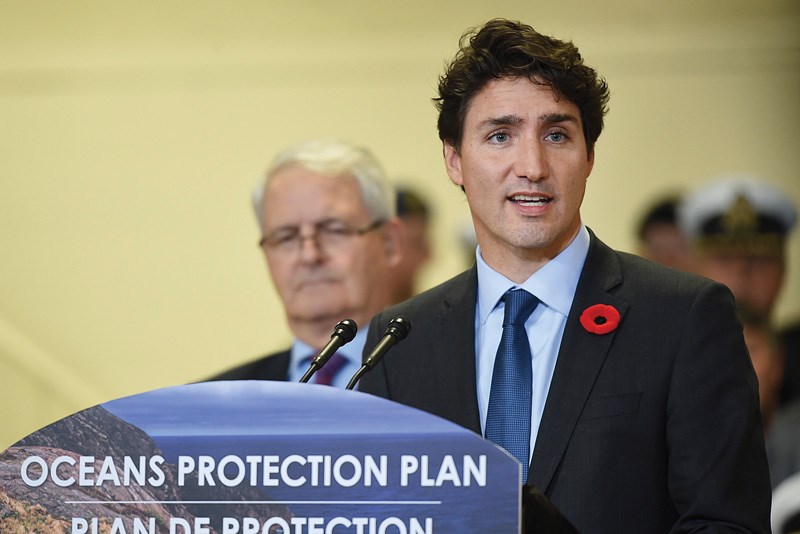Prime Minister Justin Trudeau was in Vancouver Monday to announce a $1.5-billion plan to protect Canadian coasts from oil and fuel spills – a plan that is short on spending details and which does not include a moratorium on oil tankers along the North Coast.
At a press conference held in Stanley Park at the HMCS Discovery Royal Canadian Navy reserve division, Trudeau announced an Oceans Protection Plan that he said will give Canada “one of the best marine safety and emergency preparation systems in the world.”
“Today’s announcement represents the most significant investment ever made to protect our oceans and coastlines,” he said. “Our Oceans Protection Plan will result in a truly world-class system for marine protection and emergency preparedness – one that will meet or surpass the world leading safety practices of Alaska and Norway.”
The new plan includes boosting the Canadian Coast Guard’s presence on the coast and increasing towing capacity for coast guard vessels, better monitoring of marine traffic, the creation of a new fund to finance coastal habitat restoration and partnerships with First Nations to co-manage coastal protection programs.
Whether it will meet the B.C.’s government’s definition of a “world-class” marine protection and response plan remains to be seen, however. The federal plan announced Monday is short on the kind of details that B.C.’s own demands laid out as part of its five conditions for approving new oil pipelines, including Kinder Morgan’s Trans Mountain pipeline, which is due for a federal decision in the coming weeks.
Responding to the announcement, B.C. Premier Christy Clark said there aren’t enough details to judge whether it meets B.C.’s demands for a world-class oil spill response plan.
“This looks like a proposal that will meet needs that we have today,” she said. “It’s no secret to British Columbians that we don’t have the Coast Guard response that we need right now.”
Even if the federal government approved the Trans Mountain pipeline project, Clark said the province needs to do its own environmental assessment, as per a B.C. Supreme Court decision.
“So there is still a lot of work to do, should Kinder Morgan be approved,” she said.
In making the announcement, Trudeau took pains to avoid any link between Ottawa’s new plan and the pending decision on the Trans Mountain pipeline twinning project.
A decision on that project is expected by mid-December.
When asked about the link between the new plan and oil pipelines, like the Trans Mountain project, Trudeau suggested the new plan should be put into place, regardless of whether new pipelines are approved, and pointed to the diesel fuel spill in Bella Bella as one recent example.
Local critics, however, say the timing of the announcement seems to be paving the way for an approval of the Trans Mountain application.
“Absolutely, the timing is pretty obvious right there,” said Janice Edmonds, founder of North Shore NOPE, one of the local groups that spoke against the project at the National Energy Board’s hearings.
Edmonds said she welcomed the funds for increased marine safety, but she cautioned, it will do nothing to mitigate the risk the Trans Mountain pipeline project would pose to the Burrard Inlet.
“If he’s prefacing his announcement of the approval of the Kinder Morgan pipeline with this increased marine response thinking that it will make a difference, it won’t. “Diluted bitumen sinks,” she said referencing a report by the National Academy of Science from 2015.
“You can’t recover it. It will be at the bottom of the ocean and on the beaches for decades after.”
And a spill would also mean chemicals vapourizing into the local atmosphere, impacting air quality.
“You can’t put a boom around the air,” Edmonds added.

Local First Nations, Including the Tsleil-Waututh and Squamish, are also opposed to the pipeline. On Monday, a group of Squamish Nation members went to Park Royal to put on a show of solidarity with activists at the Standing Rock Sioux Reservation currently attempting to fend off construction of the Dakota Access pipeline.
“The red, the black, the white, and the yellow – they’re all being brutalized,” said Sam George, Squamish Nation elder. “Because of the expenses, we can’t make it there so we show our support by doing what we did at Park Royal.”
George said we could expect similar protests to erupt here if the government moves to approve the Trans Mountain pipeline.
“I could almost guarantee that,” he said.
“It’s not just the natives. It’s a lot of people who don’t want to see it because we’ve all seen the devastation that it can do. ... I would be there. I would stand shoulder-to-shoulder with the people that protested.”
– with files from Brent Richter, North Shore News
For more Business in Vancouver stories, click here.



